英国合同法复习资料
英国的合同法

英国的合同法【原创实用版】目录1.引言:介绍英国合同法的重要性和历史背景2.英国合同法的基本原则3.英国合同法的主要条款4.英国合同法的案例分析5.结论:总结英国合同法的特点和影响正文英国的合同法是英国法律体系中的一个重要组成部分,其历史可以追溯到中世纪。
随着商业活动的不断发展和经济全球化的趋势,英国合同法在国际贸易中扮演着越来越重要的角色。
本文将介绍英国合同法的基本原则、主要条款以及通过案例分析来更好地理解英国合同法。
首先,英国合同法的基本原则包括:合同自由原则、诚实信用原则和法律约束力原则。
合同自由原则意味着当事人可以自由地约定合同内容,只要不违反法律的强制性规定。
诚实信用原则要求合同当事人在履行合同过程中要保持真诚、诚信和公平。
法律约束力原则则强调合同是法律意义上的约定,必须遵守。
其次,英国合同法的主要条款包括:合同的订立、合同的履行、违约责任和损害赔偿。
合同的订立是指当事人通过协商达成一致的过程,包括要约和承诺两个阶段。
合同的履行是指合同当事人按照约定的内容和方式履行合同的过程。
违约责任是指当事人未履行合同义务所需承担的法律责任。
损害赔偿则是违约责任的一种表现形式,用于弥补受害方因违约行为所遭受的损失。
在英国合同法中,案例分析是理解法律条款和原则的重要途径。
例如,在“哈德利诉巴克斯代尔”案中,法院明确了合同的订立需要满足一定的条件,如要约和承诺的明确性、当事人的真实意愿等。
另一个案例“阿尔伯特诉霍洛普”则强调了合同当事人在履行合同过程中应遵循诚实信用原则,否则将承担违约责任。
总之,英国合同法在国际贸易中具有重要地位,其基本原则和主要条款为合同的订立、履行、违约责任和损害赔偿提供了明确的法律依据。
英国的合同法
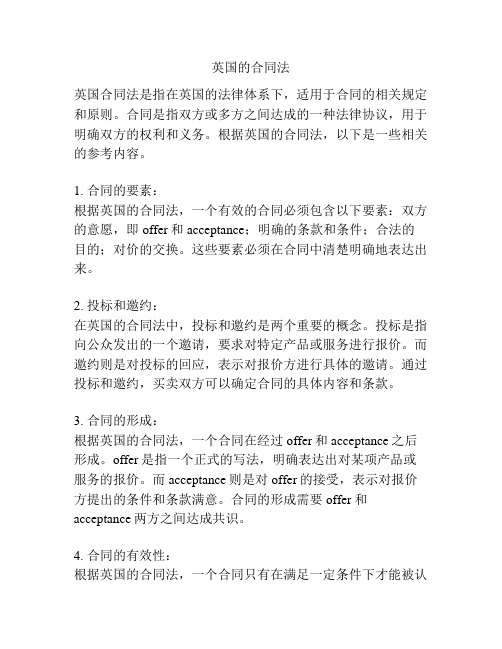
英国的合同法英国合同法是指在英国的法律体系下,适用于合同的相关规定和原则。
合同是指双方或多方之间达成的一种法律协议,用于明确双方的权利和义务。
根据英国的合同法,以下是一些相关的参考内容。
1. 合同的要素:根据英国的合同法,一个有效的合同必须包含以下要素:双方的意愿,即offer和acceptance;明确的条款和条件;合法的目的;对价的交换。
这些要素必须在合同中清楚明确地表达出来。
2. 投标和邀约:在英国的合同法中,投标和邀约是两个重要的概念。
投标是指向公众发出的一个邀请,要求对特定产品或服务进行报价。
而邀约则是对投标的回应,表示对报价方进行具体的邀请。
通过投标和邀约,买卖双方可以确定合同的具体内容和条款。
3. 合同的形成:根据英国的合同法,一个合同在经过offer和acceptance之后形成。
offer是指一个正式的写法,明确表达出对某项产品或服务的报价。
而acceptance则是对offer的接受,表示对报价方提出的条件和条款满意。
合同的形成需要offer和acceptance两方之间达成共识。
4. 合同的有效性:根据英国的合同法,一个合同只有在满足一定条件下才能被认为是有效的。
合同的有效性要求双方都具备完全的法律能力,即成年人且没有精神障碍;合同的内容必须是合法的,不得违反公共秩序或违背法律法规;合同的目的必须是明确的,合同的条款和条件必须清晰明确。
5. 违约和违约赔偿:根据英国的合同法,当一方未能履行其在合同中的义务时,被认为是违约。
违约方可能需要支付赔偿金或履行补救措施。
赔偿金的数额通常是按照损失的程度来确定的。
违约一方也有可能面临法律诉讼的风险。
6. 合同解除和修改:根据英国的合同法,合同可能会因为种种原因被解除或修改。
解除是指在一些特定情况下,合同可以被双方同意或按照法律规定提前终止。
修改是指在一些情况下,合同的条款和条件可以根据双方的协商进行调整。
7. 合同的争议解决:如果在合同履行过程中出现争议,双方可以通过协商、调解或仲裁等方式解决。
英国合同法相关问题

The principle of English contract law(英国合同法的原则)1.合同自由原则2.合同公平正义原则3.合理预期原则(合同当事人、第三人或社会公众基于现有的法律、公认的社会道德、风俗、惯例和习惯而对合同关系所产生的正当的心理期待)4.合同相对性原则5.近因原则(尤其在海上保险法中)6.禁止反言原则(英国学者鲍尔给禁止反言原则下的定义为:“假如某人(声明人)以言语或行动向别人(受声明人)作声明,又或声明人有义务说话或采取行动而不履行义务,因此,以缄默或不行动作出声明,而声明人的实际或推定的意向是,而结果亦是:导致受声明人基于该声明改变(坏的改变)了处境,日后在任何声明人与受声明人之间的诉讼中,假如受声明人在适当的时候,用适当的方法反对,声明人不得做任何与他事前做的声明有实质上不同的陈词,亦不得举证证明该不同的陈词。
”)7.合同受阻原则(合同受阻,是指合同订立后,出现了双方对之没有过失、事先无法预料,因而无法在合同中作出相应规定的客观情况变化,使得合同的履行成为不可能,或者即使合同的履行仍然可能,但所需花费的代价太大,对履行的各方会带来巨大的经济损失,因而使其订立合同的经济目的不能实现。
)8.过失相抵原则(1、受害人因加害人的侵权行为而遭受损失;2、受害人对于损害的发生或者扩大也具有过失;3、过失相抵的法律后果是减轻或免除加害人的赔偿责任;4、法院可依职权确定过失相抵原则的适用而无须当事人主张。
)Essential elements of a valid contract(有效合同的构成要件)In order to create a valid simple contract, certain essential elements must be present:Intention to create legal relations.(订约意图)Offer and Acceptance - an agreement.(要约、承诺,达成协议)Consideration.(合同须有对价)Capacity of the parties.(合同当事人须有订约能力)Genuine consent by the parties or Certainty of terms.(当事人订约意图真实或合同条款真实)Legality of object (purpose).( 合同标的或目的合法)Remedies for breach of contract(违约救济) Types of remedies:(1) Damages;(损害赔偿)(2)specific performance;(依约实际履行合同)(3)injunction;(不得做某事的禁令)(4)Rescission(撤约)1. DamagesA. nature of damages(直接损失) ;B. remoteness of damages(远期损失);C. rules calculating the amount of damages(损失计算原则):Natural loss by breach of contract;The losses within reasonable contemplation of breaching party;(合理)Causation between the breach of contract and losses;(因果关系)Mitigation by the innocent party(减轻义务所造成的损失,过失相抵原则)2.specific performance (依约实际履行合同)concept: is an equitable award ordered by the court to force the party in breach to perform his obligation in strict accordance with the contract, rather than other remedies.3.injunctionconcept:an injunction is an order of the court to restrain a party from committing a breach of contract or from doing something. In a short, injunction is an order not to do something.Mareva injunction(防止转移财产的禁令,即玛瑞瓦禁令)4. RescissionA . The condition where this remedy could be awarded-breach of condition terms.(撤约适用条件:违反合同条件条款。
英国的合同法
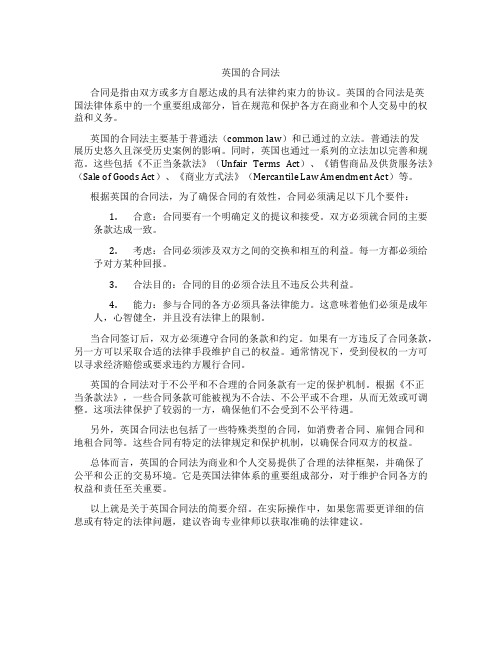
英国的合同法合同是指由双方或多方自愿达成的具有法律约束力的协议。
英国的合同法是英国法律体系中的一个重要组成部分,旨在规范和保护各方在商业和个人交易中的权益和义务。
英国的合同法主要基于普通法(common law)和已通过的立法。
普通法的发展历史悠久且深受历史案例的影响。
同时,英国也通过一系列的立法加以完善和规范。
这些包括《不正当条款法》(Unfair Terms Act)、《销售商品及供货服务法》(Sale of Goods Act)、《商业方式法》(Mercantile Law Amendment Act)等。
根据英国的合同法,为了确保合同的有效性,合同必须满足以下几个要件:1.合意:合同要有一个明确定义的提议和接受。
双方必须就合同的主要条款达成一致。
2.考虑:合同必须涉及双方之间的交换和相互的利益。
每一方都必须给予对方某种回报。
3.合法目的:合同的目的必须合法且不违反公共利益。
4.能力:参与合同的各方必须具备法律能力。
这意味着他们必须是成年人,心智健全,并且没有法律上的限制。
当合同签订后,双方必须遵守合同的条款和约定。
如果有一方违反了合同条款,另一方可以采取合适的法律手段维护自己的权益。
通常情况下,受到侵权的一方可以寻求经济赔偿或要求违约方履行合同。
英国的合同法对于不公平和不合理的合同条款有一定的保护机制。
根据《不正当条款法》,一些合同条款可能被视为不合法、不公平或不合理,从而无效或可调整。
这项法律保护了较弱的一方,确保他们不会受到不公平待遇。
另外,英国合同法也包括了一些特殊类型的合同,如消费者合同、雇佣合同和地租合同等。
这些合同有特定的法律规定和保护机制,以确保合同双方的权益。
总体而言,英国的合同法为商业和个人交易提供了合理的法律框架,并确保了公平和公正的交易环境。
它是英国法律体系的重要组成部分,对于维护合同各方的权益和责任至关重要。
以上就是关于英国合同法的简要介绍。
在实际操作中,如果您需要更详细的信息或有特定的法律问题,建议咨询专业律师以获取准确的法律建议。
英国的合同法
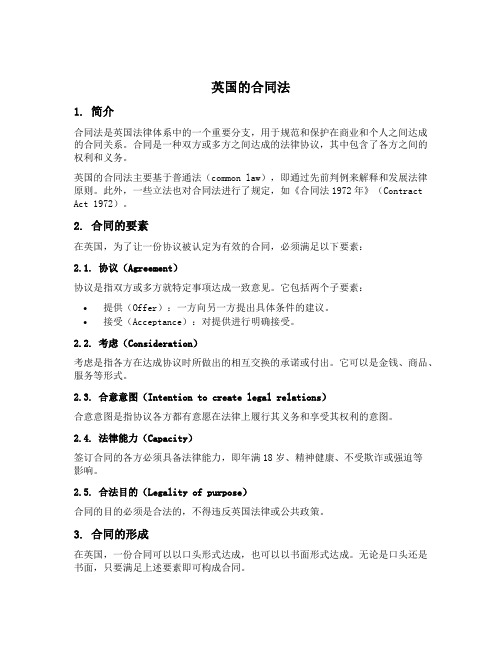
英国的合同法1. 简介合同法是英国法律体系中的一个重要分支,用于规范和保护在商业和个人之间达成的合同关系。
合同是一种双方或多方之间达成的法律协议,其中包含了各方之间的权利和义务。
英国的合同法主要基于普通法(common law),即通过先前判例来解释和发展法律原则。
此外,一些立法也对合同法进行了规定,如《合同法1972年》(Contract Act 1972)。
2. 合同的要素在英国,为了让一份协议被认定为有效的合同,必须满足以下要素:2.1. 协议(Agreement)协议是指双方或多方就特定事项达成一致意见。
它包括两个子要素:•提供(Offer):一方向另一方提出具体条件的建议。
•接受(Acceptance):对提供进行明确接受。
2.2. 考虑(Consideration)考虑是指各方在达成协议时所做出的相互交换的承诺或付出。
它可以是金钱、商品、服务等形式。
2.3. 合意意图(Intention to create legal relations)合意意图是指协议各方都有意愿在法律上履行其义务和享受其权利的意图。
2.4. 法律能力(Capacity)签订合同的各方必须具备法律能力,即年满18岁、精神健康、不受欺诈或强迫等影响。
2.5. 合法目的(Legality of purpose)合同的目的必须是合法的,不得违反英国法律或公共政策。
3. 合同的形成在英国,一份合同可以以口头形式达成,也可以以书面形式达成。
无论是口头还是书面,只要满足上述要素即可构成合同。
3.1. 口头合同口头合同是指双方之间通过口头协议达成的合同。
尽管没有书面证据,但它们仍然具有法律效力。
然而,为了减少争议和误解,书面合同通常更为常见。
3.2. 书面合同书面合同是指以书面形式记录并签署的协议。
它们可以采用传统纸质文件或电子文档形式。
在某些特定情况下,一些类型的协议可能需要满足特定的书面要求,如房地产交易。
4. 合同的解释当合同中存在争议或不明确之处时,法院将依据合同法对合同进行解释。
英国1999年合同法
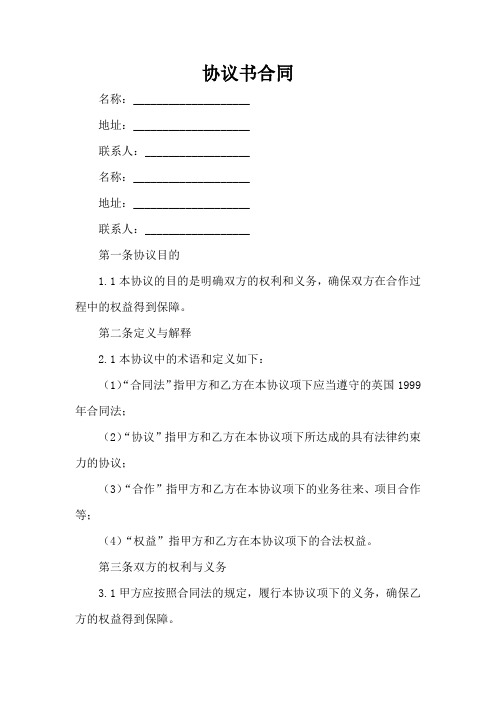
协议书合同名称:____________________地址:____________________联系人:__________________名称:____________________地址:____________________联系人:__________________第一条协议目的1.1本协议的目的是明确双方的权利和义务,确保双方在合作过程中的权益得到保障。
第二条定义与解释2.1本协议中的术语和定义如下:(1)“合同法”指甲方和乙方在本协议项下应当遵守的英国1999年合同法;(2)“协议”指甲方和乙方在本协议项下所达成的具有法律约束力的协议;(3)“合作”指甲方和乙方在本协议项下的业务往来、项目合作等;(4)“权益”指甲方和乙方在本协议项下的合法权益。
第三条双方的权利与义务3.1甲方应按照合同法的规定,履行本协议项下的义务,确保乙方的权益得到保障。
3.2乙方应按照合同法的规定,履行本协议项下的义务,确保甲方的权益得到保障。
第四条协议的变更与解除4.1双方同意,本协议的变更或解除必须以书面形式进行,并经双方签字盖章确认。
4.2在本协议履行过程中,如发生不可抗力等特殊情况,导致本协议无法继续履行,双方应友好协商解决,并根据合同法的规定办理相关手续。
第五条争议解决5.1双方在履行本协议过程中发生的争议,应通过友好协商解决;如协商无果,任何一方均有权将争议提交至有管辖权的人民法院诉讼解决。
第六条法律适用与管辖6.1本协议的签订、效力、解释、履行及争议解决等均适用英国1999年合同法。
6.2双方同意,本协议的签订地、履行地及争议解决地均为______(具体地点)。
第七条其他约定7.1本协议自双方签字盖章之日起生效,有效期为______年。
7.2本协议一式两份,甲乙双方各执一份,具有同等法律效力。
甲方(盖章):____________________乙方(盖章):____________________甲方代表(签字):_______________乙方代表(签字):_______________签订日期:____________________协议书合同名称:____________________地址:____________________联系人:__________________名称:____________________地址:____________________联系人:__________________第一条协议目的1.1本协议的目的是明确双方的权利和义务,确保双方在合作过程中的权益得到保障。
英国的合同法
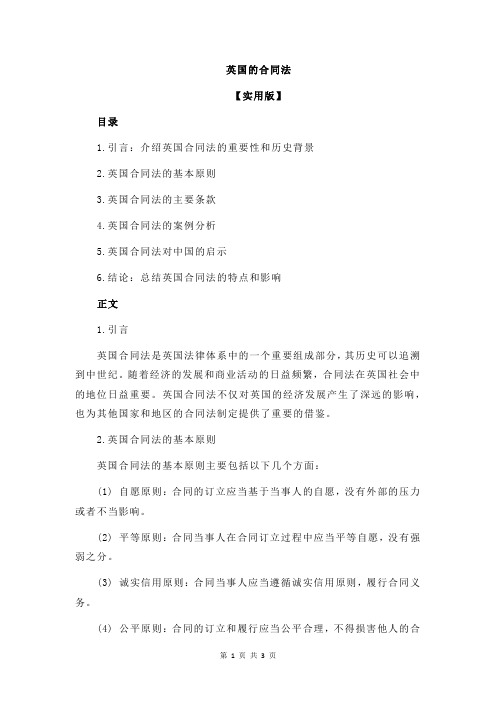
英国的合同法【实用版】目录1.引言:介绍英国合同法的重要性和历史背景2.英国合同法的基本原则3.英国合同法的主要条款4.英国合同法的案例分析5.英国合同法对中国的启示6.结论:总结英国合同法的特点和影响正文1.引言英国合同法是英国法律体系中的一个重要组成部分,其历史可以追溯到中世纪。
随着经济的发展和商业活动的日益频繁,合同法在英国社会中的地位日益重要。
英国合同法不仅对英国的经济发展产生了深远的影响,也为其他国家和地区的合同法制定提供了重要的借鉴。
2.英国合同法的基本原则英国合同法的基本原则主要包括以下几个方面:(1) 自愿原则:合同的订立应当基于当事人的自愿,没有外部的压力或者不当影响。
(2) 平等原则:合同当事人在合同订立过程中应当平等自愿,没有强弱之分。
(3) 诚实信用原则:合同当事人应当遵循诚实信用原则,履行合同义务。
(4) 公平原则:合同的订立和履行应当公平合理,不得损害他人的合法权益。
3.英国合同法的主要条款英国合同法主要包括以下几个方面的条款:(1) 合同的订立:包括要约和承诺两个阶段。
(2) 合同的履行:当事人应当按照约定履行自己的合同义务。
(3) 合同的变更和解除:在特定情况下,当事人可以协商变更或者解除合同。
(4) 违约责任:当事人不履行合同义务时,应当承担违约责任。
4.英国合同法的案例分析英国合同法的案例分析主要包括以下几个方面的案例:(1) 合同的订立:例如,某公司向另一家公司发出报价单,报价单被对方接受,合同即告成立。
(2) 合同的履行:例如,某公司向另一家公司订购一批货物,对方按照约定的时间和质量交付货物,合同即告履行。
(3) 合同的变更和解除:例如,某公司向另一家公司订购一批货物,由于市场变化,双方协商变更合同条款,以适应新的市场环境。
(4) 违约责任:例如,某公司向另一家公司订购一批货物,对方未能按照约定的时间和质量交付货物,构成违约,应当承担违约责任。
5.英国合同法对中国的启示英国合同法对中国的启示主要包括以下几个方面:(1) 完善合同法制度:中国应当借鉴英国合同法的成功经验,不断完善自己的合同法制度。
英国合同五要素主题
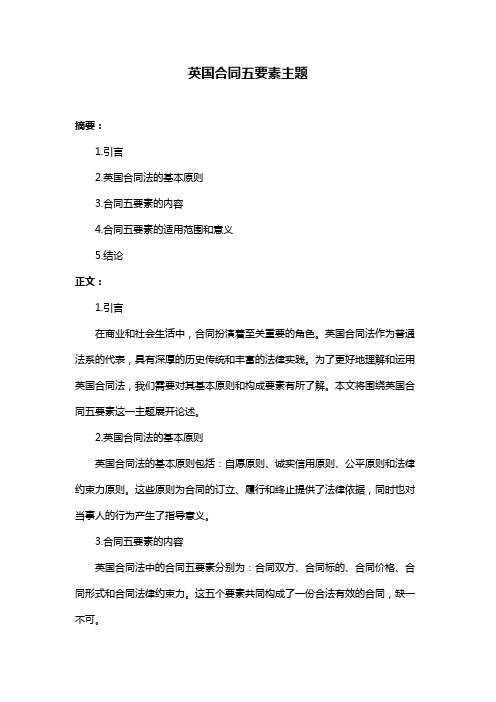
英国合同五要素主题摘要:1.引言2.英国合同法的基本原则3.合同五要素的内容4.合同五要素的适用范围和意义5.结论正文:1.引言在商业和社会生活中,合同扮演着至关重要的角色。
英国合同法作为普通法系的代表,具有深厚的历史传统和丰富的法律实践。
为了更好地理解和运用英国合同法,我们需要对其基本原则和构成要素有所了解。
本文将围绕英国合同五要素这一主题展开论述。
2.英国合同法的基本原则英国合同法的基本原则包括:自愿原则、诚实信用原则、公平原则和法律约束力原则。
这些原则为合同的订立、履行和终止提供了法律依据,同时也对当事人的行为产生了指导意义。
3.合同五要素的内容英国合同法中的合同五要素分别为:合同双方、合同标的、合同价格、合同形式和合同法律约束力。
这五个要素共同构成了一份合法有效的合同,缺一不可。
(1)合同双方:合同的订立需要至少两个当事人,他们可以是自然人、法人或其他组织。
合同双方在合同中享有权利和承担义务。
(2)合同标的:合同标的是合同的核心内容,包括了合同双方约定的权利和义务。
合同标的必须明确、具体,以确保合同的履行。
(3)合同价格:合同价格是指合同标的对应的价款或者报酬。
在合同中,价格条款应当明确,以避免纠纷。
(4)合同形式:英国合同法要求合同形式必须符合法律规定。
常见的合同形式包括书面形式、口头形式和其他形式。
不同形式的合同具有不同的法律效力。
(5)合同法律约束力:合同法律约束力是指合同对合同双方产生的法律效力。
一份合法有效的合同,其法律约束力受法律保护,合同双方必须按照约定履行合同。
4.合同五要素的适用范围和意义合同五要素在英国合同法中具有广泛的适用范围。
无论是买卖合同、租赁合同还是雇佣合同等,都必须符合合同五要素的要求。
这五个要素为合同的订立、履行和终止提供了明确的法律依据,有利于维护当事人的合法权益,减少合同纠纷。
5.结论英国合同五要素是合同法中的基本构成要素,对于合同的订立和履行具有重要意义。
英国的合同法
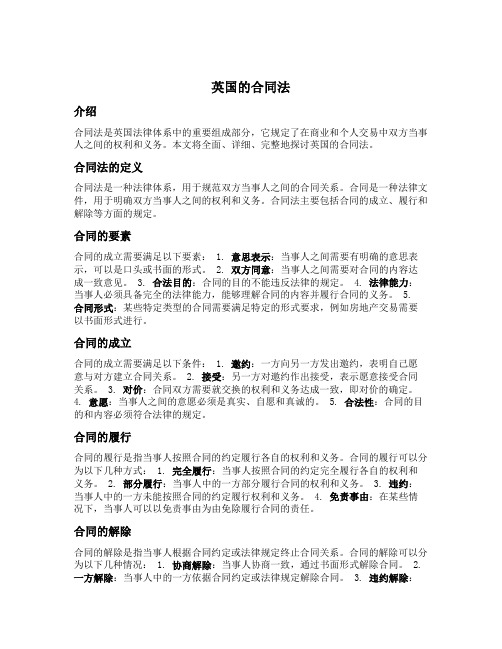
英国的合同法介绍合同法是英国法律体系中的重要组成部分,它规定了在商业和个人交易中双方当事人之间的权利和义务。
本文将全面、详细、完整地探讨英国的合同法。
合同法的定义合同法是一种法律体系,用于规范双方当事人之间的合同关系。
合同是一种法律文件,用于明确双方当事人之间的权利和义务。
合同法主要包括合同的成立、履行和解除等方面的规定。
合同的要素合同的成立需要满足以下要素: 1. 意思表示:当事人之间需要有明确的意思表示,可以是口头或书面的形式。
2. 双方同意:当事人之间需要对合同的内容达成一致意见。
3. 合法目的:合同的目的不能违反法律的规定。
4. 法律能力:当事人必须具备完全的法律能力,能够理解合同的内容并履行合同的义务。
5. 合同形式:某些特定类型的合同需要满足特定的形式要求,例如房地产交易需要以书面形式进行。
合同的成立合同的成立需要满足以下条件: 1. 邀约:一方向另一方发出邀约,表明自己愿意与对方建立合同关系。
2. 接受:另一方对邀约作出接受,表示愿意接受合同关系。
3. 对价:合同双方需要就交换的权利和义务达成一致,即对价的确定。
4. 意愿:当事人之间的意愿必须是真实、自愿和真诚的。
5. 合法性:合同的目的和内容必须符合法律的规定。
合同的履行合同的履行是指当事人按照合同的约定履行各自的权利和义务。
合同的履行可以分为以下几种方式: 1. 完全履行:当事人按照合同的约定完全履行各自的权利和义务。
2. 部分履行:当事人中的一方部分履行合同的权利和义务。
3. 违约:当事人中的一方未能按照合同的约定履行权利和义务。
4. 免责事由:在某些情况下,当事人可以以免责事由为由免除履行合同的责任。
合同的解除合同的解除是指当事人根据合同约定或法律规定终止合同关系。
合同的解除可以分为以下几种情况: 1. 协商解除:当事人协商一致,通过书面形式解除合同。
2. 一方解除:当事人中的一方依据合同约定或法律规定解除合同。
英国合同法
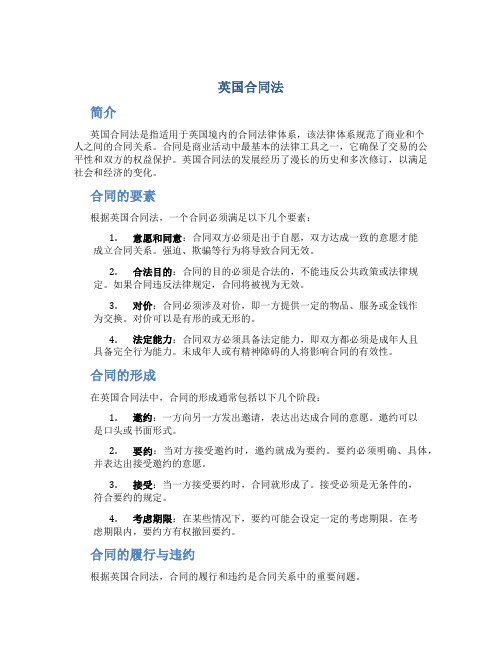
英国合同法简介英国合同法是指适用于英国境内的合同法律体系,该法律体系规范了商业和个人之间的合同关系。
合同是商业活动中最基本的法律工具之一,它确保了交易的公平性和双方的权益保护。
英国合同法的发展经历了漫长的历史和多次修订,以满足社会和经济的变化。
合同的要素根据英国合同法,一个合同必须满足以下几个要素:1.意愿和同意:合同双方必须是出于自愿,双方达成一致的意愿才能成立合同关系。
强迫、欺骗等行为将导致合同无效。
2.合法目的:合同的目的必须是合法的,不能违反公共政策或法律规定。
如果合同违反法律规定,合同将被视为无效。
3.对价:合同必须涉及对价,即一方提供一定的物品、服务或金钱作为交换。
对价可以是有形的或无形的。
4.法定能力:合同双方必须具备法定能力,即双方都必须是成年人且具备完全行为能力。
未成年人或有精神障碍的人将影响合同的有效性。
合同的形成在英国合同法中,合同的形成通常包括以下几个阶段:1.邀约:一方向另一方发出邀请,表达出达成合同的意愿。
邀约可以是口头或书面形式。
2.要约:当对方接受邀约时,邀约就成为要约。
要约必须明确、具体,并表达出接受邀约的意愿。
3.接受:当一方接受要约时,合同就形成了。
接受必须是无条件的,符合要约的规定。
4.考虑期限:在某些情况下,要约可能会设定一定的考虑期限。
在考虑期限内,要约方有权撤回要约。
合同的履行与违约根据英国合同法,合同的履行和违约是合同关系中的重要问题。
1.履行:合同的履行是指双方按照合同约定的条款和条件执行合同。
履行可以是一次性的或分期的。
2.违约:当一方未能履行合同的一部分或全部条款时,将发生违约。
违约可能会导致受损方要求赔偿或解除合同。
3.救济措施:在合同违约的情况下,受损方可以采取多种救济措施,如要求赔偿、要求履行、要求解除合同等。
合同的解除和修订英国合同法规定了解除和修订合同的情况和程序。
1.解除:当合同中的一方违反了合同条款,另一方有权解除合同。
解除合同可能会导致违约方支付违约金或赔偿。
英国合同法全文中英对照
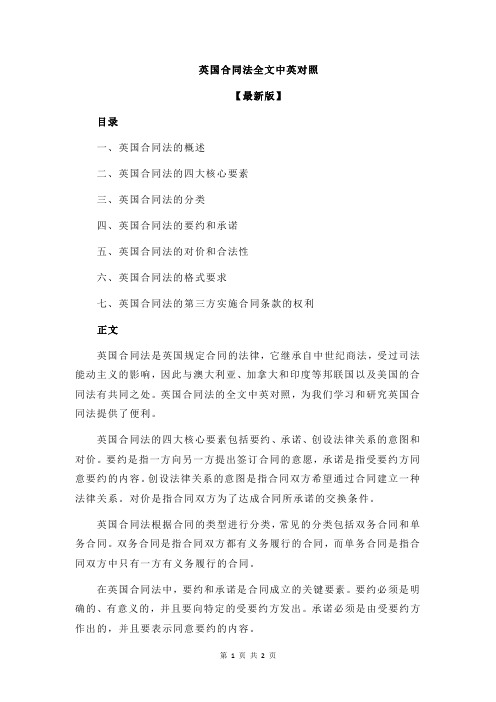
英国合同法全文中英对照【最新版】目录一、英国合同法的概述二、英国合同法的四大核心要素三、英国合同法的分类四、英国合同法的要约和承诺五、英国合同法的对价和合法性六、英国合同法的格式要求七、英国合同法的第三方实施合同条款的权利正文英国合同法是英国规定合同的法律,它继承自中世纪商法,受过司法能动主义的影响,因此与澳大利亚、加拿大和印度等邦联国以及美国的合同法有共同之处。
英国合同法的全文中英对照,为我们学习和研究英国合同法提供了便利。
英国合同法的四大核心要素包括要约、承诺、创设法律关系的意图和对价。
要约是指一方向另一方提出签订合同的意愿,承诺是指受要约方同意要约的内容。
创设法律关系的意图是指合同双方希望通过合同建立一种法律关系。
对价是指合同双方为了达成合同所承诺的交换条件。
英国合同法根据合同的类型进行分类,常见的分类包括双务合同和单务合同。
双务合同是指合同双方都有义务履行的合同,而单务合同是指合同双方中只有一方有义务履行的合同。
在英国合同法中,要约和承诺是合同成立的关键要素。
要约必须是明确的、有意义的,并且要向特定的受要约方发出。
承诺必须是由受要约方作出的,并且要表示同意要约的内容。
英国合同法强调对价的概念,即合同双方为了达成合同所承诺的交换条件。
对价不能是过去的对价,因为在英国法律中,合同订立之前完成的行为一般来说不能作为对价,因为它不是对新允诺的交换,而过去的对价对于要约人来说是没有什么用的。
英国合同法的格式要求比较严格,某些合同要求要正式的签名手续和见证人。
例如,股权转让、支票、消费信贷等合同要求必须采用书面形式。
英国合同法还规定了第三方实施合同条款的权利。
根据英国合同法,非合同当事方(第三人)也可享有实施合同条款的权利,如果合同中的某些条款涉及到第三方的利益。
总之,英国合同法是一部较为复杂的法律体系,它对合同的成立、履行和终止都有着详细的规定。
英国的合同法
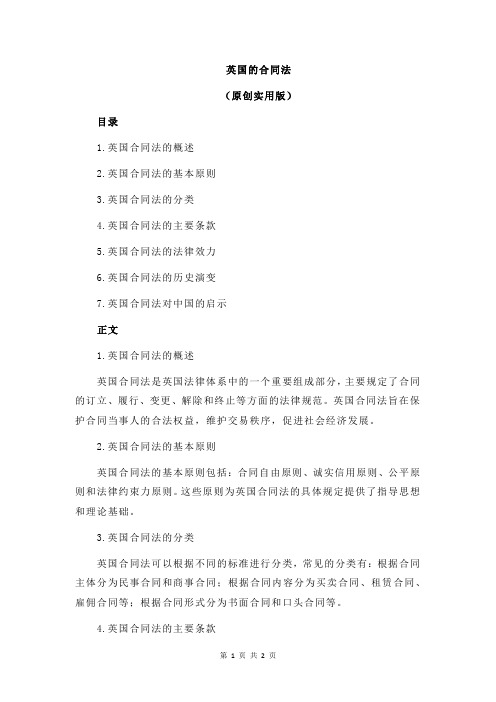
英国的合同法(原创实用版)目录1.英国合同法的概述2.英国合同法的基本原则3.英国合同法的分类4.英国合同法的主要条款5.英国合同法的法律效力6.英国合同法的历史演变7.英国合同法对中国的启示正文1.英国合同法的概述英国合同法是英国法律体系中的一个重要组成部分,主要规定了合同的订立、履行、变更、解除和终止等方面的法律规范。
英国合同法旨在保护合同当事人的合法权益,维护交易秩序,促进社会经济发展。
2.英国合同法的基本原则英国合同法的基本原则包括:合同自由原则、诚实信用原则、公平原则和法律约束力原则。
这些原则为英国合同法的具体规定提供了指导思想和理论基础。
3.英国合同法的分类英国合同法可以根据不同的标准进行分类,常见的分类有:根据合同主体分为民事合同和商事合同;根据合同内容分为买卖合同、租赁合同、雇佣合同等;根据合同形式分为书面合同和口头合同等。
4.英国合同法的主要条款英国合同法的主要条款包括:合同的订立、合同的履行、合同的变更、合同的解除和合同的终止。
这些条款规定了合同当事人的权利和义务,为解决合同纠纷提供了法律依据。
5.英国合同法的法律效力英国合同法具有法律效力,即合同当事人必须按照合同的约定履行自己的义务。
如果合同当事人违反合同约定,将承担违约责任。
英国合同法还规定了合同的法律效力范围,包括合同的生效、履行、终止等方面的法律问题。
6.英国合同法的历史演变英国合同法的历史演变可以追溯到中世纪,经历了普通法、衡平法和现代合同法等阶段。
随着时间的推移,英国合同法不断完善和发展,为英国社会经济的繁荣做出了重要贡献。
7.英国合同法对中国的启示英国合同法在合同自由、诚实信用、公平原则等方面具有较高的理论水平和实践经验,值得中国借鉴。
英国合同法复习资料
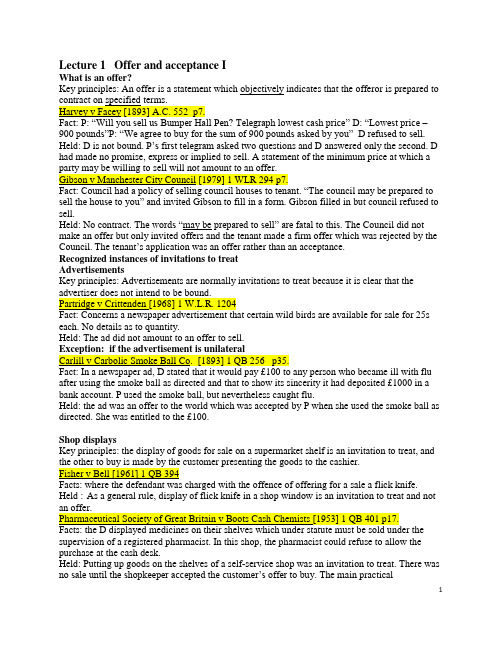
Lecture 1 Offer and acceptance IWhat is an offer?Key principles: An offer is a statement which objectively indicates that the offeror is prepared to900 pounds”P:“We agree to buy for the sum of 900 pounds asked by you” D refused to sell. Held: D is not b ound. P’s first telegram asked two questions and D answered only the second. D had made no promise, express or implied to sell. A statement of the minimum price at which ahe council may be prepared to sell the house to you” and invited Gibson to fill in a form. Gibson filled in but council refused to sell.Held: No contract. The words “may be prepared to sell” are fatal to this. The Council did not make an offer but only invited offers and the tenant made a firm offer which was rejected by the Council.The tenant’s application was an offer rather than an acceptance.Recognized instances of invitations to treatAdvertisementsKey principles: Advertisements are normally invitations to treat because it is clear that theeach. No details as to quantity.Held: The ad did not amount to an offer to sell.after using the smoke ball as directed and that to show its sincerity it had deposited £1000 in a bank account. P used the smoke ball, but nevertheless caught flu.Held: the ad was an offer to the world which was accepted by P when she used the smoke ball as directed. She was entitled to the £100.Shop displaysKey principles: the display of goods for sale on a supermarket shelf is an invitation to treat, andHeld :As a general rule, display of flick knife in a shop window is an invitation to treat and notsupervision of a registered pharmacist. In this shop, the pharmacist could refuse to allow the purchase at the cash desk.Held: Putting up goods on the shelves of a self-service shop was an invitation to treat. There was no sale until the shopkeeper accepted the customer’s offer to buy. The main practicalconsequence of this are under the law of contract, shops are not bound to sell goods at the price indicated and a customer cannot demand to buy a particular item on display.TendersKey principles: a circular inviting the submission of tenders is normally an invitation to treat andsold at a discount in one lot. The plaintiff argued that the defendant has to sell to the highest tender.Held: For the defendant. An offer for sale in the tender is just an invitation to treat. There iscompanies to cover its employees’ medical and life insurance.Held: It was confirmed that an invitation to tender is no more than an intention to receive bids. Situations where there is a contractual obligation to accept the most competitive bidKey principles: an invitation to submit tenders may amount to an offer where it is clear that the seller intends to sell to the highest bidder. (The invitation to tender may amount to an offer of“we bind ourselves to accept (the highest) offer. P bid $2175000 and D2 bid $2100000 or $101000 “in excess of any other offer. D1 believed that they were bound to accept the bid of D2, as being the highest bid.Held: the invitation to tender amounted to an offer to sell to the highest bidder, however, the “referential” bid of the type adopted by D2 was not permissible in a transaction of this kind and therefore D1 was bound to accept the P’s bid. (the third party’s bid was a referential bid and was not a valid offer.)An obligation to consider tendersKey principles: an invitation to submit tenders is an offer to open and consider all confirmingletter stated that ’No tender which is received after the last date and time specified’ would be considered. P’s tender was posted by hand in the D’s letter box before the deadline expired, but D’s staff did not empty the box and the P’s tender was not considered.Held: all tenders submitted which complied with the tendering procedure would be opened and considered together with the other conforming tenders. The invitation to tender was a unilateral offer was accepted by the submission of a tender. The court held that the defendants were contractually bound to consider the P’s tender.AuctionsKey principles: an ad for an auction is normally an invitation to treat, and the bid is the offer which can be accepted by the auctioneer. In an auction, the auctioneer’s request for bids is anat an auction sale. The P attended the sale to buy the office furniture, but it was withdrawn from the sale. The P claimed that the ad amounted to an offer to sell the furniture which he accepted by attending the auction.Held: the ad did not amount to a promise to sell the furniture.price of the goods, D refused to receive the money or to deliver the goods.Held: Where an auction is made “without reserve”, the au ctioneer is under a contractual obligation to sell it to the highest bidder. An ad to hold an auction “without reserve” would amount to an offer to sell to the highest bidder.Legislation: Sale of Goods Ordinance S60•In the case of a sale by auction-•(a) where goods are put up for sale by auction in lots, each lot is prima facie deemed to be the subject of a separate contract of sale;(b) a sale by auction is complete when the auctioneer announces its completion by the fall of the hammer, or in other customary manner. Until such announcement is made any bidder may retract his bid;(c) where a sale by auction is not notified to be subject to a right to bid on behalf of the seller, it shall not be lawful for the seller to bid himself or to employ any person to bid at such sale, or for the auctioneer knowingly to take any bid from the seller or any such person. Any sale contravening this rule may be treated as fraudulent by the buyer;(d) a sale by auction may be notified to be subject to a reserve or upset price, and a right to bid may also be reserved expressly by or on behalf of the seller.Lecture 2: Offer and AcceptanceUnilateral Contracts: In a unilateral contract, the offeror performs his part of the obligation when he makes the offer and if the offeree wishes to enter into the contract, the offeree must perform his part. Examples of unilateral contracts: Reward cases; “If” contractsprovide the required articles for 12months. P placed orders, all of which were carried out except the last one. D argued that he was not legally obliged to supply the goods, and so was not in breach of contract.Held: the agreement to supply for a year was a standing offer which was accepted each time an order was placed. A promise to supply as much as a buyer may order becomes binding upon the promisor when the buyer makes an acceptance. The court reasoned that the fact that the contract may have been unilateral in nature did not prevent it from being binding. [In terms of consideration, the redistribution of the pre-contractual risks was sufficient consideration for contract formation.Offer in Unilateral Contractspublished advertisements in the Pall Mall Gazette and other newspapers on November 13, 1891, claiming that it would pay £100 to anyone who got sick with influenza after using its product according to the instructions set out in the advertisement. And £1000 is deposited with the Alliance Bank, Regent Street, showing our sincerity in the matter. Mrs Louisa Elizabeth Carlill saw the advertisement, bought one of the balls and used three times daily for nearly two months until she contracted the flu on January 17, 1892. She claimed £100 from the Carbolic Smoke Ball Company.Held: Bowen J stated that a unilateral contract was not made with all the world, it is an offer made to the whole world and the contract was made with a limited portion of the public who came forward and perform the condition on the faith of the advertisement.Acceptance in unilateral contractIn unilateral contracts, performance of the conditions of the offer amounts to acceptance; there is no requirement of actual communication.Communication of acceptanceKey principles: in unilateral contracts, no need to communicate acceptance to the offeror.The relevance of motive in acting on the terms of a unilateral offerKey principles: motive of the offeree is irrelevant provided the offeree does what is required byFacts: Plaintiff gave information not because of the reward but to ease her conscience.Walter Carwardine was murdered in Hereford. The plaintiff, Mrs Williams, gave evidence at the Hereford assizes against two suspects, but did not say all she knew. The suspects were acquitted. On April 25, 1831, the victim's brother and defendant, Mr Carwardine, published a handbill, stating there would be a £20 for...Whoever would give such information as would lead to the discovery of the murder of Walter Carwardine. In August, 1831, the Mrs Williams gave more information which led to the conviction of two men (including a Mr John Williams, theplaintiff's husband). She claimed the reward. Mr Carwardine refused to pay. At the trial her motives were examined. It was found that she knew about the reward, but that she did not give information specifically to get the reward.Held: P’s motive is not material.The Court helds, that the plaintiff was entitled to recover the £20. The advertisement amounted to a general promise or contract to pay the offered reward to any person who performed the condition mentioned in it, namely, who gave the information.Two judges clearly stated that motives were irrelevant. Littledale J said, "If the person knows of the handbill and does the thing, that is quite enough." Patteson J said "We cannot go into the plaintiff's motives."When the act was done in ignorance of the offerKey principles: There cannot be assent without knowledge of the offer; and ignorance of the offer is the same thing whether it is due to never hearing of it or forgetting it after hearing. Under the situation where the act was done in ignorance of the offer(completely don't know, forget andto compel the Crown to pay a reward it had offered for information leading to the conviction of a murderer. The claimant gave the information. But he gave it while he was under investigation himself for murder. He told the police "exclusively in order to clear himself". It was uncertain whether he was thinking about the reward at the time he coughed up the information.Held: No contract. The acceptance must be communicated. There cannot be assent without knowledge of the offer; and ignorance of the offer is the same thing whether it is due to never hearing of it or forgetting it after hearing…”Revocation of an offer in a unilateral contractKey principles: once the offeree has begun to perform the terms of an unilateral offer, it could not be revoked by the offeror but it would cease to bind him if the offeree left it incomplete and unperformed, unless such performance is unnecessary. (Abbott v Lance (1860) Legge’s Newpaid the mortgage, the house would be theirs. They started to do so, and then split. The dad died. He left the house to his widow. She brought an action to eject the daughter in law.Held: P acted on the promise. D cannot eject them in disregard of it. The father’s unilateral offer could not be revoked after they had started to pay.He said there was no need to imply an obligation to complete the payments. The limit is where the daughter stops paying, and the father’s estate has to pick up the bill. Then she would lose her right to stay. The couple were on alicense, short of a tenancy but a contractual, or at least equitable right to remain, which would grow into good equitable title as soon as the mortgage was paid.When can the offeree claim the benefits promised by the offerorKey principles: The reward or commission is only paid to the offeree once all the terms of theat least £185000 each, then he would be paid a commission. Willing purchaser was found by the P but the D did not want to complete the transaction.Held: P was not entitled to the commission because it is only payable on completion of sale. Lord Russel: the agent took the risk in the hope of a substantial remuneration for a comparatively small exertion.Bilateral contractBilateral contracts: in bilateral contracts, there is an exchange of promises (offer and acceptance) The offer is made to an identified person or party.Offer in bilateral contractThe offer is made to an identified person or partyAcceptance in Bilateral ContractsRequirements of a valid acceptanceKey principles: the acceptance must be unconditional and unequivocal.(any change in the contract is not allowed generally Mirror rule)In bilateral contracts, the acceptance of the offer must be communicated by the offeree or his agent. Actual communication is required here.Examples of waiver of communication of acceptanceWhere acceptance is made by post, the offeree doesn’t have to have actual communication with the offerorSilenceSizing Europe off his nephew, John Felthouse. After a letter from the nephew about a previous discussion in buying the horse, the uncle replied saying, "If I hear no more about him, I consider the horse mine at £30 and 15s." The nephew did not reply. He was busy at auctions on his farmin Tamworth. He told the man running the auctions, William Bindley, to not sell the horse. But by accident, Bindley did. Uncle Felthouse then sued Bindley in the tort of conversion - using someone else's property inconsistently with their rights. But for the Uncle to show the horse was his property, he had to show there was a valid contract. Bindley argued there was not, since the nephew had never communicated his acceptance of the uncle's offer.Held: the nephew had not communicated his intention and had not done anything to bind himself, so there was no valid acceptance.Acceptance must be communicated clearly and cannot beimposed due to silence of one of the parties. The uncle had no right to impose a sale through silence whereby the contract would only fail by repudiation. Though the nephew expressed interest in completing the sale there was no communication of that intention.Exception: When silence would amount to acceptancea.when the offeree has taken benefit under the contractb.when the offeree agreed that his silence would constitute acceptanceinsurance. The managing director, Mr ffooks, met with Mr Polland, from the Inland Revenue and said he would pay future tax as it fell due and the arrears at £1000 a month. Mr Polland said he would have to check and would contact the managing director if it was unacceptable. Selectmove Ltd heard nothing till a £25,650 notice came in and a threat of a wind-up petition. Mr ffooks subsequently claimed that the Revenue had said he could repay less. The High Court held that even if that were found to be true, Mr Polland had not bound the Revenue, and there was no consideration for the varied agreement anyway.Judgment: Peter Gibson LJ (Stuart-Smith LJ and Balcombe LJ concurring) said that the House of Lords case, Foakes v Beer precluded any variation of the agreement to repay the debt without good consideration, despite the recent decision in Williams v Roffey Bros Ltd. Peter Gibson LJ state ‘it is clear… that a practical benefit of that nature is not good consideration in law’. He felt bound by Foakes and could not apply Roffey to leave it without any application, despite seeing the 'force of argument'. It is the offeree who waives his right.c.when the offeree has accepted the offer by his conduct - See Brogden v MetropolitanCompany with coals for a number of years. Brogden then suggested that a formal contract should be entered into between them for longer term coal supply. Each side's agents met together and negotiated. Metropolitan's agents drew up some terms of agreement and sent them to Brogden. Brogden wrote in some parts which had been left blank and inserted an arbitrator who would decide upon differences which might arise. He wrote "approved" at the end and sent back the agreement documents. Metropolitan's agent filed the documents and did nothing more. For a while, both acted according to the agreement document's terms. But then some more serious disagreements arose, and Brogden argued that there had been no formal contract actually established.Judgment: The House of Lords (The Lord Chancellor, Lord Cairns, Lord Hatherley, Lord Selborne, Lord Blackburn, and Lord Gordon) held that a contract had arisen by conduct and Brogden had been in clear breach, so he must be liable. The word "approved" on the document with Brogden's name was binding on all the partners, since Brogden was the chief partner, even though the standard signature of “B. & Sons” was not used. A mere mental assent to the agreement's terms would not have been enough, but having acted on the terms made it so. Lord Blackburn also held that the onus of showing that both parties had acted on the terms of an agreement which had not been, in due form, executed by either, lies upon person alleging such facts.Communication of acceptance in Bilateral ContractsKey principles: It must be by the offeree or his agent. Communication of acceptance by a thirdhim. One of them, acting without authority, told the plaintiff he had been accepted. Later the managers decided to appoint someone else. The claimant brought an action alleging that by breach of a contract to employ him he had suffered damages in loss of salary.Held: communication not valid. The county court judge held that there was no contract as there had been no authorized communication of intention to contract on the part of the body, that is, the managers, alleged to be a party to the contract.Prescribed method of acceptanceKey principles: The method of acceptance prescribed by the offeror must be followed by the offeree. If he fails to do so, as a general rule, such acceptance does not give rise to an agreement. ExceptionKey principles: Where no method of acceptance has been prescribed, the offeree must follow a reasonable method.a)Where the parties are at arm’s length, the offeree should follow the same method as used by the offeror to send his offer or more expeditious method.b)Sometimes the method of acceptance prescribed may not be the sole method of acceptance. In that situation, an alternative method may be considered appropriate.Manchester Diocesan Council of Education v Commercial & General Investments Ltd. [1970] 1 WLR 241 p68.Facts: MD called for tenders relating to property. C&G submitted a tender (offer to buy). The tender stated that acceptance was to be notified to the person whose tender was accepted by letter sent ‘by post addressed to the address given in his tender’. MD decided to accept C&G tende r and sent their acceptance to the CG's solicitor, which was not the address given in the offer.C&G knew of this acceptance.Held: Clause 4 does not say that posting a letter addressed to the D shall be the sole permitted method of communicating an acceptance. The parties became contractually bound. The method of acceptance prescribed in the tender was not mandatory - here the offeror was made aware of the acceptance by an equally effective method and thus the acceptance was effective.“The Postal Rule”:Where post is the prescribed method for sending an acceptance or is reasonable to use post, the acceptance is deemed to be complete when the letter is posted.Key principles: The offeror is bound by the acceptance even though the letter of acceptance isto the plaintiffs offering to sell them certain fleeces of wool and requiring an answer in the course of post. The defendants, misdirected the letter so that the plaintiffs did not receive it until 5 September. The plaintiffs posted their acceptance on the same day but it was not received until 9 September. Meanwhile, on 8 September, the defendants, not having received an answer by 7 September as they had expected, sold the wool to someone else. The defendants argued that therecould not be a binding contract until the answer was actually received, and until then they were free to sell the wool to another buyerHeld: Law J said that if that was true it would be impossible to complete any contract through the post; if the defendants were not bound by their offer until the answer was received, then the plaintiffs would not be bound until they had received word that the defendants had received their acceptance, and this could go on indefinitely.[1] Instead it must be considered that the offerors were making the offer to the plaintiffs during every moment that the letter was in the post. Then when the Offeree has placed his acceptance in the post there is a fictional meeting of minds, which concludes the offer and gives effect to the acceptance. The acceptance did not arrive in course of post strictly speaking (all parties understood in course of post to refer to 7th of September). But because the delay was the default of the defendant it was taken that thenever arrived.Held: As soon as the letter of acceptance is posted there is a binding contract, even if the letter is lost or delayed. The post office acts as the agent for both parties.The postal rule of acceptance does not apply:Where the letter of acceptance is wrongly addressed or insufficiently stamped;said option shall be exercisable by notice in writing to D at any time within 6 months from the date hereof’ The letter was posted, properly addressed and stamped but was never actual ly delivered to D.Held: The words ‘notice’ required actual communication of the acceptance, and so no contract came into force.Lecture 3: Offer and AcceptanceMethods of acceptanceC ontracts through courier services: such as DHL, Federal Express are used for making contractsArguably, the postal rule of acceptance should apply to an acceptance sent by courier service, i.e. it is effective once the letter of acceptance is handed over or to the courier serviceContracts made by instantaneous methods: such as telephone, telex, fax and email.In the case of an acceptance sent by telephone, telex or fax, it is clear that the acceptance becomes effective only after it is received by the offeror; the position is not so clear with regard to an acceptance by email.Acceptance by telephoneKey principles: The receipt rule--- acceptance takes place when the words of acceptance are clearly heard by the offeror.In terms of the conclusion of the contract:Time: the moment when the offeror receives the acceptancefrom the defendant. The defendant sent a telex in return accepting the offer. A contract was made when the defendant’s acceptance was received by the plaintiff in London.Held: the contract was only complete when the acceptance was received by P in London. The receipt rule is also applied in the situation of fax. So the time when the K is concluded is the moment when the P received the acceptance. the place where the K is concluded is London. So the jurisdiction of the contract belongs to the court in London instead of Amsterdam.Fault-based conceptLord Denning introduced a “fault-based” concept to determine the existence of a contract purported to have been made by telephone.a) offeror’s fault: where the offeror does not, due to his own fault, hears the words of acceptance; he is bo und by the contract as he will be “estopped from saying that he did not receive the message of acceptance.”b) offeree’s fault: The offeree has the duty to ensure that the words of acceptance are heard by the offeror. If the line goes dead or becomes indistinct and the offeree knows this, the offeree must repeat the message making sure that the offeror has got the correct message.Where the words of acceptance uttered by the offeree are not heard by the offeror (neither due to his fault nor due to the offer ee’s fault), there would be no contract.c) nobody’s fault: where the words of acceptance uttered by the offeree are not heard bt the offeror(neither due to offeror;s fault nor due to offeree’s fault), there would be no K. Exception to the receipt rule----telex or faxKey principles: Where an acceptance bt telex or fax is sent outside office hours, the receipt ruleHeld: It was held that the communicator could not have expected the recipient to have received the message, which was sent late Friday evening at that time. Instead it was reasonable to hold that it was actually communicated on Monday morningSupplement to the receipt rulea)intention of the partiesb)sound business practiceEnglish company, accepted by a telex sent from London to Vienna, the terms of sale offered by the sellers, an Austrian company. The contract was not performed, and the buyers issued a writ claiming damages for breach of contract. The buyers contended that they were entitled to leaveto serve the writ out of the jurisdiction under RSC, Ord.11, r.1(1)(a) on the ground that (i) the case came within para.(f) because the contract "was made within the jurisdiction" on the basis that, by analogy with the rules relating to the acceptance of an offer by post or telegram, acceptance of an offer by telex concluded a contract at the time and place the telex was sent; or (ii) the case came within para.(g) because the writ was "in respect of a breach committed within the jurisdiction.".Held: the contract was made in Vienna since in the case of instantaneous communications that was where the acceptance was received.Acceptance by Faxwho sent his acceptance by fax to Taiwan.Held: Following Entores and Brinkibon that the contract was concluded in Taiwan. Acceptance by emailsKey principles: common law rule: It is not clear when an email acceptance takes effect. However, the receipt rule applied to acceptances made by telephone, telex or fax seems to be preferable Statutory rule: Also note S19 of the Electronic Transactions Ordinance (Cap. 553) which states as follows:•“Unless otherwise agreed between the originator and the addressee of an electronic record, an electronic record is sent when it is accepted by an information system outside the control of the originator or of the person who sent the electronic record on behalf of the originator.(2) Unless otherwise agreed between the originator and the addressee of an electronic record, the time of receipt of an electronic record is determined as follows-•(a) if the addressee has designated an information system for the purpose of receiving electronic records, receipt occurs-•(i) at the time when the electronic record is accepted by the designated information system; or(ii) if the electronic record is sent to an information system of the addressee that is not the designated information system, at the time when the electronic record comes to the knowledge of the addressee;•(b) If the addressee has not designated an information system, receipt occurs when the electronic record comes to the knowledge of the addressee.”Termination of an offerAn offer may be terminated in the following ways:a. Acceptance by the offereeOnce the offeree accepts the offer, a contract comes into existence, signalling the end of the offer. “Acceptance to an offer is like a match to a train gun powder”. Where an offer is made to more than one offeree, the acceptance by one of them generally does not terminate the offers to others.b.Rejection by the offereeKey principles: a) direct rejection: a rejection of the offer by the offer materially which composes a counter-offer.b) indirect rejection: An attempt to accept an offer on new terms, not contained in the offer, is a950. D refused to sell it for that am ount. P then tried to accept D’s original offer to sell for £1000. D refused it.Held: There was no contract between A and B. When a counter-offer of £950 was proposed by B, it kills A’s original offer. When B later agreed to buy the farm for £1000, it was already a new offer and it is up to A to accept it or to reject it.Notice: request for informationKey principles: a counter-offer will kill the original offer while the request for information won’t. under the situation of counter-offer, a new offer comes into being, while in the situation of request for information, no new contract emerges. A request for information in response to anP telegraphed asking whether the iron could be delivered over a 2-month period. McLean wrote to Stevenson, Jacques & Co. in Middlesbrough asking if he could get an offer for warrants on iron ore. Stevenson said 40s per ton in cash was the lowest price, the offer open till Monday. At 9.42am, McLean telegraphed saying ‘Please wire whether you would accept forty for delivery over two months, or if not, longest limit you could give.’ Stevenson di d not answer, and sold at 1.25pm to someone else. McLean, before hearing, telegraphed saying he accepted the original offer. Stevenson refused to deliver the iron, and McLean brought an action for non-delivery. Held: P’s telegraph was not a rejection of the D’s offer. It was merely an inquiry and so P could subsequently accept D’s offer.c. Revocation by the offerorKey principles: An offer can be revoked any time before its acceptance.GuaranteeKey principles: In the case of a continuing guarantee it can be revoked any time with regard topromised to guarantee the repayment of such discounts for twelve months. Before P had discounted any bills, D had countermanded the guarantee.Held: This promise itself creates no obligation. D had a right to revoke.。
英国合同五要素主题
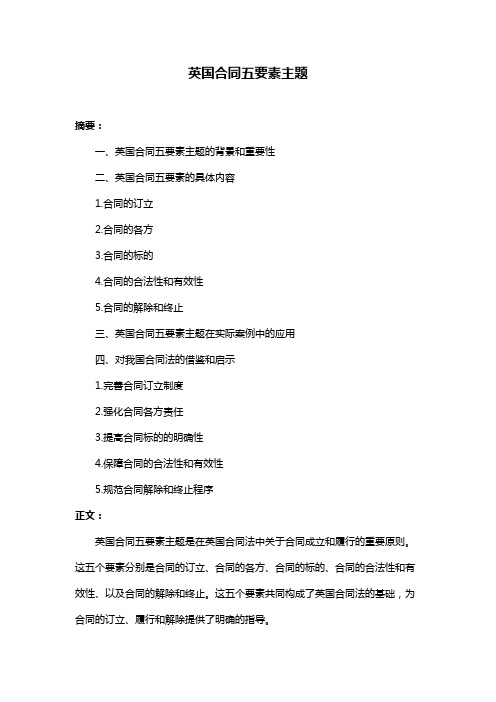
英国合同五要素主题摘要:一、英国合同五要素主题的背景和重要性二、英国合同五要素的具体内容1.合同的订立2.合同的各方3.合同的标的4.合同的合法性和有效性5.合同的解除和终止三、英国合同五要素主题在实际案例中的应用四、对我国合同法的借鉴和启示1.完善合同订立制度2.强化合同各方责任3.提高合同标的的明确性4.保障合同的合法性和有效性5.规范合同解除和终止程序正文:英国合同五要素主题是在英国合同法中关于合同成立和履行的重要原则。
这五个要素分别是合同的订立、合同的各方、合同的标的、合同的合法性和有效性、以及合同的解除和终止。
这五个要素共同构成了英国合同法的基础,为合同的订立、履行和解除提供了明确的指导。
合同的订立是英国合同五要素主题的第一要素。
合同的订立是指合同各方通过协商达成一致,形成合同的过程。
在英国,合同的订立需要满足以下条件:一是存在合法的订约意愿,即各方均具有订立合同的能力,且意思表示真实;二是合同的内容具体明确,不存在模糊不清的地方。
合同的各方是英国合同五要素主题的第二要素。
合同的各方是指参与合同订立和履行的主体,包括合同的甲方和乙方。
英国合同法强调合同各方的主体地位,要求各方在合同订立和履行过程中遵循诚实信用原则,忠实履行合同义务。
合同的标的,即英国合同五要素主题的第三要素,是合同的核心内容,是合同各方权利和义务的基础。
合同的标的主要包括货物、服务、金钱和其他财产等。
英国合同法要求合同的标的具体明确,以便于合同的履行和纠纷的解决。
合同的合法性和有效性,是英国合同五要素主题的第四要素。
合同的合法性和有效性是指合同的内容和形式是否符合法律规定。
英国合同法要求合同的内容不得违反法律规定,合同的形式也要符合法律规定。
只有合法有效的合同才能受到法律的保护。
合同的解除和终止,是英国合同五要素主题的第五要素。
合同的解除是指在合同履行过程中,因法律规定或者合同约定的原因,使合同关系终止的行为。
合同的终止是指合同因履行完毕、解除等原因,使合同关系终止的状态。
英国的合同法
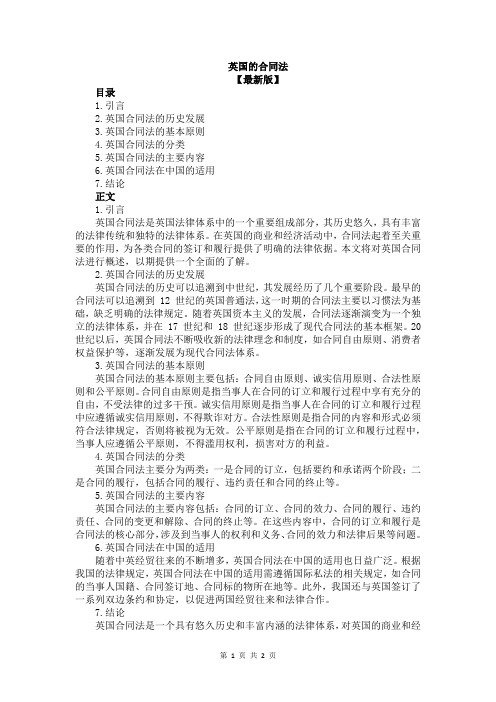
英国的合同法【最新版】目录1.引言2.英国合同法的历史发展3.英国合同法的基本原则4.英国合同法的分类5.英国合同法的主要内容6.英国合同法在中国的适用7.结论正文1.引言英国合同法是英国法律体系中的一个重要组成部分,其历史悠久,具有丰富的法律传统和独特的法律体系。
在英国的商业和经济活动中,合同法起着至关重要的作用,为各类合同的签订和履行提供了明确的法律依据。
本文将对英国合同法进行概述,以期提供一个全面的了解。
2.英国合同法的历史发展英国合同法的历史可以追溯到中世纪,其发展经历了几个重要阶段。
最早的合同法可以追溯到 12 世纪的英国普通法,这一时期的合同法主要以习惯法为基础,缺乏明确的法律规定。
随着英国资本主义的发展,合同法逐渐演变为一个独立的法律体系,并在 17 世纪和 18 世纪逐步形成了现代合同法的基本框架。
20 世纪以后,英国合同法不断吸收新的法律理念和制度,如合同自由原则、消费者权益保护等,逐渐发展为现代合同法体系。
3.英国合同法的基本原则英国合同法的基本原则主要包括:合同自由原则、诚实信用原则、合法性原则和公平原则。
合同自由原则是指当事人在合同的订立和履行过程中享有充分的自由,不受法律的过多干预。
诚实信用原则是指当事人在合同的订立和履行过程中应遵循诚实信用原则,不得欺诈对方。
合法性原则是指合同的内容和形式必须符合法律规定,否则将被视为无效。
公平原则是指在合同的订立和履行过程中,当事人应遵循公平原则,不得滥用权利,损害对方的利益。
4.英国合同法的分类英国合同法主要分为两类:一是合同的订立,包括要约和承诺两个阶段;二是合同的履行,包括合同的履行、违约责任和合同的终止等。
5.英国合同法的主要内容英国合同法的主要内容包括:合同的订立、合同的效力、合同的履行、违约责任、合同的变更和解除、合同的终止等。
在这些内容中,合同的订立和履行是合同法的核心部分,涉及到当事人的权利和义务、合同的效力和法律后果等问题。
合同法英文资料

合同法英文资料Contracts and the Law: Understanding the FundamentalsContracts are the foundation of business transactions, governing the rights and obligations of the parties involved. Understanding the nuances of contract law is crucial for individuals and organizations engaging in any form of commercial activity. This essay aims to provide a comprehensive overview of contract law, its key principles, and the essential elements that constitute a legally binding agreement.At the core of contract law lies the concept of an agreement between two or more parties. This agreement, known as a contract, is a legally enforceable promise or set of promises that create mutual obligations. Contracts can take many forms, ranging from simple handshake agreements to complex multi-party negotiations. Regardless of their complexity, all contracts share common elements that must be present for the agreement to be considered legally binding.The first and most fundamental element of a contract is the offer. An offer is a clear and unambiguous expression of one party'swillingness to enter into an agreement, specifying the terms and conditions under which they are willing to do so. This offer must be communicated to the other party, who then has the option to accept or reject it. Acceptance, the second key element, occurs when the offeree clearly and unequivocally indicates their agreement to the terms of the offer. This acceptance can be expressed through words, actions, or a combination of both.In addition to offer and acceptance, a legally binding contract must also involve the exchange of consideration. Consideration refers to the mutual benefits or detriments that the parties agree to exchange as part of the contract. This can take the form of money, goods, services, or a promise to do or refrain from doing something. The consideration must be of value and must be bargained for by the parties.Another essential element of a contract is the intent to create legal relations. This means that the parties must have a genuine intention to enter into a legally binding agreement, rather than a mere social or domestic arrangement. This intent can be inferred from the circumstances surrounding the contract, such as the nature of the transaction and the language used by the parties.Capacity is also a crucial element of contract law. This refers to the legal ability of the parties to enter into a contract. Minors, individualswith mental incapacities, and certain types of legal entities may have limited or no capacity to enter into binding agreements. Contracts involving parties with limited capacity may be subject to special rules and protections.Finally, the contract must be legal and not contrary to public policy. Contracts that involve illegal activities, such as the sale of illicit goods or services, or that violate important social or ethical norms, may be deemed unenforceable or void.Once a contract has been formed, it is subject to various principles and rules that govern its interpretation, performance, and potential breach. These include the duty of good faith and fair dealing, which requires the parties to act honestly and fairly in their interactions; the doctrine of frustration, which addresses situations where unforeseen events make the contract impossible to perform; and the concept of breach of contract, which occurs when a party fails to fulfill their contractual obligations.In the event of a breach, the non-breaching party may be entitled to remedies such as damages, specific performance, or rescission of the contract. The type and extent of the remedy will depend on the nature and severity of the breach, as well as the terms of the contract itself.Contract law is a complex and multifaceted field, with a rich history and ongoing evolution to address the ever-changing needs of the modern business landscape. Understanding the fundamental principles and elements of contract law is essential for individuals and organizations engaging in any form of commercial activity, as it provides the foundation for creating, interpreting, and enforcing legally binding agreements. By studying and applying the principles of contract law, parties can navigate the complexities of commercial transactions with confidence and mitigate the risks associated with contractual disputes.。
英国的合同法

英国的合同法摘要:1.引言2.英国合同法的基本原则3.英国合同法的历史发展4.英国合同法的主要内容5.英国合同法在国际贸易中的应用6.结论正文:1.引言合同法是英国法律体系中的一个重要组成部分,其历史可以追溯到中世纪。
作为普通法的一部分,英国合同法在全球范围内具有广泛的影响。
本文将概述英国合同法的基本原则、历史发展、主要内容以及在国际贸易中的应用。
2.英国合同法的基本原则英国合同法的基本原则主要包括:(1) 自愿原则:合同是基于自愿达成的协议,双方当事人在平等、自愿的基础上进行协商。
(2) 诚实信用原则:合同当事人应遵循诚实信用原则,履行合同义务。
(3) 对价原则:合同成立需要有对价,即一方当事人向另一方当事人支付的报酬。
(4) 合法性原则:合同的内容和目的必须符合法律规定,不得损害国家利益和社会公共利益。
3.英国合同法的历史发展英国合同法的历史可以追溯到中世纪,经历了普通法、衡平法和现代合同法等阶段。
随着英国资本主义的发展,合同法不断完善,以适应经济和社会发展的需要。
4.英国合同法的主要内容英国合同法主要包括以下几个方面:(1) 合同的订立:合同的订立需要经过要约和承诺两个阶段。
要约是向特定或非特定人发出的,表示愿意与他人订立合同的意思表示;承诺是受要约人同意要约的意思表示。
(2) 合同的履行:合同当事人应按照约定的内容和方式履行合同。
如果一方当事人未履行合同义务,另一方当事人有权要求履行或赔偿损失。
(3) 合同的变更和解除:在合同履行过程中,当事人可以协商一致变更或解除合同。
此外,法律还规定了特定情况下的合同解除权。
(4) 违约责任:合同当事人违反合同约定的,应承担违约责任。
违约责任包括赔偿损失、支付违约金等。
5.英国合同法在国际贸易中的应用英国合同法在国际贸易中具有广泛的应用。
英国是国际贸易的重要中心,许多国际贸易合同都适用英国合同法。
在国际贸易中,合同的订立、履行、变更、解除和违约责任等方面都需要遵循英国合同法的规定。
英国合同五要素主题

英国合同五要素主题【实用版】目录1.引言2.英国合同法的基本原则3.合同五要素的内容和定义4.合同五要素在英国合同法中的应用5.结论正文【引言】在英国的法律体系中,合同法占据着重要的地位。
合同是双方或多方之间的协议,约定了各方之间的权利和义务。
英国合同法的基本原则是合同的自由原则和诚实信用原则。
英国合同法对合同的成立和执行都有严格的规定,其中最著名的就是合同五要素。
【英国合同法的基本原则】英国合同法的基本原则主要有两个,一个是合同自由原则,另一个是诚实信用原则。
合同自由原则指的是,只要双方自愿,就可以自由订立合同,不受任何限制。
诚实信用原则则是指,在合同的订立和执行过程中,各方都应该遵守诚实信用原则,不得欺诈,不得违背合同的初衷。
【合同五要素的内容和定义】合同五要素是英国合同法中的重要概念,它包括了以下五个要素:要约、承诺、有意达成法律关系、合法对价和合法形式。
这五个要素是合同成立的必要条件,缺少其中任何一个,合同都无法成立。
【合同五要素在英国合同法中的应用】在英国合同法中,合同五要素的应用非常广泛。
首先,要约是指一方向另一方发出的,表示愿意与其订立合同的意思表示。
要约必须明确、具体,并且能够被接受。
承诺是指受要约人对要约人的要约作出的接受的意思表示。
有意达成法律关系是指合同各方都有意通过合同建立法律关系。
合法对价是指合同各方都应该提供相应的对价,即合同各方都应该得到相应的利益。
合法形式是指合同的订立和执行都应该符合法律规定的形式。
【结论】英国合同法中的合同五要素,是合同成立和执行的必要条件。
它既保障了合同各方的权益,又维护了合同的公平性和合法性。
英国合同法详论

英国合同法详论1. 引言英国合同法是英国法律体系中的基础法律之一,旨在调节合同关系中的权利和义务。
本文将全面详细、完整且深入地讨论英国合同法的相关内容。
2. 合同的定义和要素合同是双方自愿达成的具有法律约束力的协议。
英国合同法规定了合同的要素,包括:•提供明确的要约和接受;•双方必须有法定能力;•双方必须有意愿达成合同;•必须有对价或合法的代替要素。
3. 合同的形成和有效性合同的形成分为要约和接受阶段。
要约是提出合同的一方表达意愿的行为,接受是对要约的明确回应。
要约和接受的通讯可以是口头、书面或通过行为方式进行。
4. 合同条款和解释合同中的条款是约束各方行为的规则。
英国合同法要求条款清晰明确,并强调合同的字面意义。
如果条款有多种解释,法官将根据合同当事人的意图、合同的上下文和商业常识进行解释。
5. 合同违约和赔偿如果一方未履行合同义务,就构成合同违约。
英国合同法规定了违约方应承担的赔偿责任,并采用了合理补偿原则。
违约方需支付损失赔偿金,以补偿对方因违约行为而遭受的损失。
6. 合同的解除和修订合同可以通过解除或修订来终止。
解除是指合同中的一方提前终止合同,可能会导致违约;修订是对合同进行修改。
英国合同法规定了解除和修订的条件和程序。
7. 公平交易和消费者保护英国合同法强调公平交易原则,并鼓励合同当事人诚实信用。
此外,英国还有一系列消费者保护法律,保护消费者的权益,防止不公平合同条款的存在。
8. 合同纠纷的解决合同纠纷可以通过诉讼、仲裁或其他替代争议解决机制来解决。
英国合同法对这些解决方式进行了规范,并鼓励当事人通过协商和合作解决纠纷。
9. 合同法的变革和发展随着社会和商业环境的变化,合同法也在不断发展和演变。
英国合同法通过法院的判例和立法进行修订和完善,以适应新的需求和挑战。
结论英国合同法是一部非常重要的法律,在商业和个人生活中都有广泛的应用。
本文对英国合同法的定义、要素、形成、有效性、解释、违约、解除、修订、公平交易、消费者保护、合同纠纷解决以及发展进行了全面讨论。
- 1、下载文档前请自行甄别文档内容的完整性,平台不提供额外的编辑、内容补充、找答案等附加服务。
- 2、"仅部分预览"的文档,不可在线预览部分如存在完整性等问题,可反馈申请退款(可完整预览的文档不适用该条件!)。
- 3、如文档侵犯您的权益,请联系客服反馈,我们会尽快为您处理(人工客服工作时间:9:00-18:30)。
英国合同法复习资料 -CAL-FENGHAI-(2020YEAR-YICAI)_JINGBIANLecture 1 Offer and acceptance IWhat is an offer?Key principles: An offer is a statement which objectively indicates that the offeror is prepared900 pounds”P:“We agree to buy for the sum of 900 pounds asked by you” D refused to sell. Held: D is not b ound. P’s first telegram asked two questions and D answered only the second. D had made no promise, express or implied to sell. A statement of the minimum price at which asell the house to you” and invited Gibson to fill in a form. Gibson filled in but council refused to sell.Held: No contract. The words “may be prepared to sell” are fatal to this. The Council did not make an offer but only invited offers and the tenant made a firm offer which was rejected by the Council. The tenant’s application was an offer rather than an acceptance.Recognized instances of invitations to treatAdvertisementsKey principles: Advertisements are normally invitations to treat because it is clear that theeach. No details as to quantity.Held: The ad did not amount to an offer to sell.after using the smoke ball as directed and that to show its sincerity it had deposited £1000 in a bank account. P used the smoke ball, but nevertheless caught flu.Held: the ad was an offer to the world which was accepted by P when she used the smoke ball as directed. She was entitled to the £100.Shop displaysKey principles: the display of goods for sale on a supermarket shelf is an invitation to treat, andHeld :As a general rule, display of flick knife in a shop window is an invitation to treat and notsupervision of a registered pharmacist. In this shop, the pharmacist could refuse to allow the purchase at the cash desk.Held: Putting up goods on the shelves of a self-service shop was an invitation to treat. There was no sale until the shopkeeper accepted the customer’s offer to buy. The main practical consequence of this are under the law of contract, shops are not bound to sell goods at the price indicated and a customer cannot demand to buy a particular item on display.TendersKey principles: a circular inviting the submission of tenders is normally an invitation to treat andsold at a discount in one lot. The plaintiff argued that the defendant has to sell to the highest tender.Held: For the defendant. An offer for sale in the tender is just an invitation to treat. There iscompanies to cover its employees’ medical and life insurance.Held: It was confirmed that an invitation to tender is no more than an intention to receive bids. Situations where there is a contractual obligation to accept the most competitive bidKey principles: an invitation to submit tenders may amount to an offer where it is clear that the seller intends to sell to the highest bidder. (The invitation to tender may amount to an offer of“we bind ourselves to accept (the highest) offer. P bid $2175000 and D2 bid $2100000 or $101000 “in excess of any other offer. D1 believed that they were bound to accept the bid of D2, as being the highest bid.Held: the invitation to tender amounted to an offer to sell to the highest bidder, however, the “referential” bid of the type adopted by D2 was not permissible in a transaction of this kind and therefore D1 was bound to accept the P’s bid. (the third party’s bid was a referential bid and was not a valid offer.)An obligation to consider tendersKey principles: an invitation to submit tenders is an offer to open and consider all confirmingletter stated that ’No tender which is received after the last date and time specified’ would be considered. P’s tender was posted by hand in the D’s letter box before the deadline expired, but D’s staff did not empty the box and the P’s tender was not considered.Held: all tenders submitted which complied with the tendering procedure would be opened and considered together with the other conforming tenders. The invitation to tender was aunilateral offer was accepted by the submission of a tender. The court held that the defendants were contractually bound to consider the P’s tender.AuctionsKey principles: an ad for an auction is normally an invitation to treat, and the bid is the offer which can be accepted by the auctioneer. In an auction, the auctioneer’s request for bids is anere to be sold at an auction sale. The P attended the sale to buy the office furniture, but it was withdrawn from the sale. The P claimed that the ad amounted to an offer to sell the furniture which he accepted by attending the auction.Held: the ad did not amount to a promise to sell the furniture.the price of the goods, D refused to receive the money or to deliver the goods.Held: Where an auction is made “without reserve”, the au ctioneer is under a contractual obligation to sell it to the highest bidder. An ad to hold an auction “without reserve” would amount to an offer to sell to the highest bidder.Legislation: Sale of Goods Ordinance S60•In the case of a sale by auction-•(a) where goods are put up for sale by auction in lots, each lot is prima facie deemed to be the subject of a separate contract of sale;•(b) a sale by auction is complete when the auctioneer announces its completion by the fall of the hammer, or in other customary manner. Until such announcement is made any bidder may retract his bid;•(c) where a sale by auction is not notified to be subject to a right to bid on behalf of the seller, it shall not be lawful for the seller to bid himself or to employ any person to bid at such sale, or for the auctioneer knowingly to take any bid from the seller or any such person. Any sale contravening this rule may be treated as fraudulent by the buyer;•(d) a sale by auction may be notified to be subject to a reserve or upset price, and a right to bid may also be reserved expressly by or on behalf of the seller.Lecture 2: Offer and AcceptanceUnilateral Contracts: In a unilateral contract, the offeror performs his part of the obligation when he makes the offer and if the offeree wishes to enter into the contract, the offeree must perform his part. Examples of unilateral contracts: Reward cases; “If” contractsprovide the required articles for 12months. P placed orders, all of which were carried out except the last one. D argued that he was not legally obliged to supply the goods, and so was not in breach of contract.Held: the agreement to supply for a year was a standing offer which was accepted each time an order was placed. A promise to supply as much as a buyer may order becomes binding upon the promisor when the buyer makes an acceptance. The court reasoned that the fact that the contract may have been unilateral in nature did not prevent it from being binding. [In terms of consideration, the redistribution of the pre-contractual risks was sufficient consideration for contract formation.Offer in Unilateral Contractspublished advertisements in the Pall Mall Gazette and other newspapers on November 13, 1891, claiming that it would pay £100 to anyone who got sick with influenza after using its product according to the instructions set out in the advertisement. And £1000 is deposited with the Alliance Bank, Regent Street, showing our sincerity in the matter. Mrs Louisa Elizabeth Carlill saw the advertisement, bought one of the balls and used three times daily for nearly two months until she contracted the flu on January 17, 1892. She claimed £100 from the Carbolic Smoke Ball Company.Held: Bowen J stated that a unilateral contract was not made with all the world, it is an offer made to the whole world and the contract was made with a limited portion of the public who came forward and perform the condition on the faith of the advertisement.Acceptance in unilateral contractIn unilateral contracts, performance of the conditions of the offer amounts to acceptance; there is no requirement of actual communication.Communication of acceptanceKey principles: in unilateral contracts, no need to communicate acceptance to the offeror.The relevance of motive in acting on the terms of a unilateral offerKey principles: motive of the offeree is irrelevant provided the offeree does what is required byWalter Carwardine was murdered in Hereford. The plaintiff, Mrs Williams, gave evidence at the Hereford assizes against two suspects, but did not say all she knew. The suspects were acquitted. On April 25, 1831, the victim's brother and defendant, Mr Carwardine, published a handbill, stating there would be a £20 for...Whoever would give such information as would lead to the discovery of the murder of Walter Carwardine. In August, 1831, the Mrs Williams gave more information which led to the conviction of two men (including a Mr John Williams, the plaintiff's husband). She claimed the reward. Mr Carwardine refused to pay. At the trial her motives were examined. It was found that she knew about the reward, but that she did not give information specifically to get the reward.Held: P’s motive is not material.The Court helds, that the plaintiff was entitled to recover the £20. The advertisement amounted to a general promise or contract to pay the offered reward to any person who performed the condition mentioned in it, namely, who gave the information.Two judges clearly stated that motives were irrelevant. Littledale J said, "If the person knows of the handbill and does the thing, that is quite enough." Patteson J said "We cannot go into the plaintiff's motives."When the act was done in ignorance of the offerKey principles: There cannot be assent without knowledge of the offer; and ignorance of the offer is the same thing whether it is due to never hearing of it or forgetting it after hearing. Under the situation where the act was done in ignorance of the offer(completely don't know,wanted to compel the Crown to pay a reward it had offered for information leading to the conviction of a murderer. The claimant gave the information. But he gave it while he was under investigation himself for murder. He told the police "exclusively in order to clear himself". It was uncertain whether he was thinking about the reward at the time he coughed up the information.Held: No contract. The acceptance must be communicated. There cannot be assent without knowledge of the offer; and ignorance of the offer is the same thing whether it is due to never hearing of it or forgetting it after hearing…”Revocation of an offer in a unilateral contractKey principles: once the offeree has begun to perform the terms of an unilateral offer, it could not be revoked by the offeror but it would cease to bind him if the offeree left it incompleteand unperformed, unless such performance is unnecessary. (Abbott v Lance (1860) Legge’s Newpaid the mortgage, the house would be theirs. They started to do so, and then split. The dad died. He left the house to his widow. She brought an action to eject the daughter in law. Held: P acted on the promise. D cannot eject them in disregard of it. The father’s unilateral offer could not be revoked after they had started to pay.He said there was no need to imply an obligation to complete the payments. The limit is where the daughter stops paying, and the father’s est ate has to pick up the bill. Then she would lose her right to stay. The couple were on a license, short of a tenancy but a contractual, or at least equitable right to remain, which would grow into good equitable title as soon as the mortgage was paid.When can the offeree claim the benefits promised by the offerorKey principles: The reward or commission is only paid to the offeree once all the terms of theat least £185000 each, then he would be paid a commission. Willing purchaser was found by the P but the D did not want to complete the transaction.Held: P was not entitled to the commission because it is only payable on completion of sale. Lord Russel: the agent took the risk in the hope of a substantial remuneration for a comparatively small exertion.Bilateral contractBilateral contracts: in bilateral contracts, there is an exchange of promises (offer and acceptance) The offer is made to an identified person or party.Offer in bilateral contractThe offer is made to an identified person or partyAcceptance in Bilateral ContractsRequirements of a valid acceptanceKey principles: the acceptance must be unconditional and unequivocal.(any change in the contract is not allowed generally Mirror rule)In bilateral contracts, the acceptance of the offer must be communicated by the offeree or his agent. Actual communication is required here.Examples of waiver of communication of acceptanceWhere acceptance is made by post, the offeree doesn’t have to have actual communication with the offerorSilenceKey principles: silence cannot normally be prescribed as a mode of acceptance.Sizing Europe off his nephew, John Felthouse. After a letter from the nephew about a previous discussion in buying the horse, the uncle replied saying, "If I hear no more about him, I consider the horse mine at £30 and 15s." The nephew did not reply. He was busy at auctions on his farm in Tamworth. He told the man running the auctions, William Bindley, to not sell the horse. But by accident, Bindley did. Uncle Felthouse then sued Bindley in the tort of conversion - using someone else's property inconsistently with their rights. But for the Uncle to show the horse was his property, he had to show there was a valid contract. Bindley argued there was not, since the nephew had never communicated his acceptance of the uncle's offer.Held: the nephew had not communicated his intention and had not done anything to bind himself, so there was no valid acceptance.Acceptance must be communicated clearly and cannot be imposed due to silence of one of the parties. The uncle had no right to impose a sale through silence whereby the contract would only fail by repudiation. Though the nephew expressed interest in completing the sale there was no communication of that intention. Exception: When silence would amount to acceptancea.when the offeree has taken benefit under the contractb.when the offeree agreed that his silence would constitute acceptancenational insurance. The managing director, Mr ffooks, met with Mr Polland, from the Inland Revenue and said he would pay future tax as it fell due and the arrears at £1000 a month. Mr Polland said he would have to check and would contact the managing director if it was unacceptable. Selectmove Ltd heard nothing till a £25,650 notice came in and a threat of a wind-up petition. Mr ffooks subsequently claimed that the Revenue had said he could repay less. The High Court held that even if that were found to be true, Mr Polland had not bound the Revenue, and there was no consideration for the varied agreement anyway.Judgment: Peter Gibson LJ (Stuart-Smith LJ and Balcombe LJ concurring) said that the House of Lords case, Foakes v Beer precluded any variation of the agreement to repay the debt without good consideration, despite the recent decision in Williams v Roffey Bros Ltd. Peter Gibson LJ state ‘it is clear… that a practical benefit of that nature is not good consideration in law’. He felt bound by Foakes and could not apply Roffey to leave it without any application, despite seeing the 'force of argument'. It is the offeree who waives his right.c.when the offeree has accepted the offer by his conduct - See Brogden v MetropolitanCompany with coals for a number of years. Brogden then suggested that a formal contract should be entered into between them for longer term coal supply. Each side's agents met together and negotiated. Metropolitan's agents drew up some terms of agreement and sent them to Brogden. Brogden wrote in some parts which had been left blank and inserted an arbitrator who would decide upon differences which might arise. He wrote "approved" at the end and sent back the agreement documents. Metropolitan's agent filed the documents anddid nothing more. For a while, both acted according to the agreement document's terms. But then some more serious disagreements arose, and Brogden argued that there had been no formal contract actually established.Judgment: The House of Lords (The Lord Chancellor, Lord Cairns, Lord Hatherley, Lord Selborne, Lord Blackburn, and Lord Gordon) held that a contract had arisen by conduct and Brogden had been in clear breach, so he must be liable. The word "approved" on the document with Brogden's name was binding on all the partners, since Brogden was the chief partner, even though the standard signature of “B. & Sons” was not used. A mere mental assent to the agreement's terms would not have been enough, but having acted on the terms made it so. Lord Blackburn also held that the onus of showing that both parties had acted on the terms of an agreement which had not been, in due form, executed by either, lies upon person alleging such facts.Communication of acceptance in Bilateral ContractsKey principles: It must be by the offeree or his agent. Communication of acceptance by a thirdappoint him. One of them, acting without authority, told the plaintiff he had been accepted. Later the managers decided to appoint someone else. The claimant brought an action alleging that by breach of a contract to employ him he had suffered damages in loss of salary.Held: communication not valid. The county court judge held that there was no contract as there had been no authorized communication of intention to contract on the part of the body, that is, the managers, alleged to be a party to the contract.Prescribed method of acceptanceKey principles: The method of acceptance prescribed by the offeror must be followed by the offeree. If he fails to do so, as a general rule, such acceptance does not give rise to an agreement.ExceptionKey principles: Where no method of acceptance has been prescribed, the offeree must follow a reasonable method.a)Where the parties are at arm’s length, the offeree should follow the same method as used by the offeror to send his offer or more expeditious method.b)Sometimes the method of acceptance prescribed may not be the sole method of acceptance. In that situation, an alternative method may be considered appropriate.Manchester Diocesan Council of Education v Commercial & General Investments Ltd. [1970] 1 WLR 241 p68.Facts: MD called for tenders relating to property. C&G submitted a tender (offer to buy). The tender stated that acceptance was to be notified to the person whose tender was accepted by letter sent ‘by post addressed to the address given in his tender’. MD decided to a ccept C&G tender and sent their acceptance to the CG's solicitor, which was not the address given in the offer. C&G knew of this acceptance.Held: Clause 4 does not say that posting a letter addressed to the D shall be the sole permitted method of communicating an acceptance. The parties became contractually bound. The method of acceptance prescribed in the tender was not mandatory - here the offeror was made aware of the acceptance by an equally effective method and thus the acceptance was effective.“The Postal Rule”:Where post is the prescribed method for sending an acceptance or is reasonable to use post, the acceptance is deemed to be complete when the letter is posted.Key principles: The offeror is bound by the acceptance even though the letter of acceptance isto the plaintiffs offering to sell them certain fleeces of wool and requiring an answer in the course of post. The defendants, misdirected the letter so that the plaintiffs did not receive it until 5 September. The plaintiffs posted their acceptance on the same day but it was not received until 9 September. Meanwhile, on 8 September, the defendants, not having received an answer by 7 September as they had expected, sold the wool to someone else. The defendants argued that there could not be a binding contract until the answer was actually received, and until then they were free to sell the wool to another buyerHeld: Law J said that if that was true it would be impossible to complete any contract through the post; if the defendants were not bound by their offer until the answer was received, then the plaintiffs would not be bound until they had received word that the defendants had received their acceptance, and this could go on indefinitely.[1] Instead it must be considered that the offerors were making the offer to the plaintiffs during every moment that the letter was in the post. Then when the Offeree has placed his acceptance in the post there is a fictional meeting of minds, which concludes the offer and gives effect to the acceptance. The acceptance did not arrive in course of post strictly speaking (all parties understood in course of post to refer to 7th of September). But because the delay was the default of the defendant itletter never arrived.Held: As soon as the letter of acceptance is posted there is a binding contract, even if the letter is lost or delayed. The post office acts as the agent for both parties.The postal rule of acceptance does not apply:Where the letter of acceptance is wrongly addressed or insufficiently stamped;the said option shall be exercisable by notice in writing to D at any time within 6 months from the date hereof’ The letter was posted, properly addressed and stamped but w as never actually delivered to D.Held: The words ‘notice’ required actual communication of the acceptance, and so no contract came into force.Lecture 3: Offer and AcceptanceMethods of acceptanceC ontracts through courier services: such as DHL, Federal Express are used for making contracts Arguably, the postal rule of acceptance should apply to an acceptance sent by courier service, i.e. it is effective once the letter of acceptance is handed over or to the courier service Contracts made by instantaneous methods: such as telephone, telex, fax and email.In the case of an acceptance sent by telephone, telex or fax, it is clear that the acceptance becomes effective only after it is received by the offeror; the position is not so clear with regard to an acceptance by email.Acceptance by telephoneKey principles: The receipt rule--- acceptance takes place when the words of acceptance are clearly heard by the offeror.In terms of the conclusion of the contract:Time: the moment when the offeror receives the acceptancefrom the defendant. The defendant sent a telex in return accepting the offer. A contract was made when the defendant’s acceptance was received by the plaintiff in London.Held: the contract was only complete when the acceptance was received by P in London. The receipt rule is also applied in the situation of fax. So the time when the K is concluded is the moment when the P received the acceptance. the place where the K is concluded is London. So the jurisdiction of the contract belongs to the court in London instead of Amsterdam.Fault-based conceptLord Denning introduced a “fault-based” concept to determine the existence of a contract purported to have been made by telephone.a) offeror’s fault: where the offeror does not, due to his own fault, hears the words ofaccep tance; he is bound by the contract as he will be “estopped from saying that he did not receive the message of acceptance.”b) offeree’s fault: The offeree has the duty to ensure that the words of acceptance are heard by the offeror. If the line goes dead or becomes indistinct and the offeree knows this, the offeree must repeat the message making sure that the offeror has got the correct message.Where the words of acceptance uttered by the offeree are not heard by the offeror (neither due to his fault nor d ue to the offeree’s fault), there would be no contract.c) nobody’s fault: where the words of acceptance uttered by the offeree are not heard bt the offeror(neither due to offeror;s fault nor due to offeree’s fault), there would be no K. Exception to the receipt rule----telex or faxKey principles: Where an acceptance bt telex or fax is sent outside office hours, the receipt ruleHeld: It was held that the communicator could not have expected the recipient to have received the message, which was sent late Friday evening at that time. Instead it was reasonable to hold that it was actually communicated on Monday morningSupplement to the receipt rulea)intention of the partiesb)sound business practicean English company, accepted by a telex sent from London to Vienna, the terms of sale offered by the sellers, an Austrian company. The contract was not performed, and the buyers issued a writ claiming damages for breach of contract. The buyers contended that they were entitled to leave to serve the writ out of the jurisdiction under RSC, Ord.11, r.1(1)(a) on the ground that (i) the case came within para.(f) because the contract "was made within the jurisdiction" on the basis that, by analogy with the rules relating to the acceptance of an offer by post or telegram, acceptance of an offer by telex concluded a contract at the time and place the telex was sent; or (ii) the case came within para.(g) because the writ was "in respect of a breach committed within the jurisdiction.".Held: the contract was made in Vienna since in the case of instantaneous communications that was where the acceptance was received.Acceptance by Faxwho sent his acceptance by fax to Taiwan.Held: Following Entores and Brinkibon that the contract was concluded in Taiwan.Acceptance by emailsKey principles: common law rule: It is not clear when an email acceptance takes effect. However, the receipt rule applied to acceptances made by telephone, telex or fax seems to be preferableStatutory rule: Also note S19 of the Electronic Transactions Ordinance (Cap. 553) which states as follows:•“Unless otherwise agreed between the originator and the addressee of an electr onic record, an electronic record is sent when it is accepted by an information system outside the control of the originator or of the person who sent the electronic record on behalf of the originator.•(2) Unless otherwise agreed between the originator and the addressee of an electronic record, the time of receipt of an electronic record is determined as follows-•(a) if the addressee has designated an information system for the purpose of receiving electronic records, receipt occurs-•(i) at the time when the electronic record is accepted by the designated information system; or•(ii) if the electronic record is sent to an information system of the addressee that is not the designated information system, at the time when the electronic record comes to the knowledge of the addressee;•(b) If the addressee has not designated an information system, receipt occurs when the electronic record comes to the knowledge of the addressee.”Termination of an offerAn offer may be terminated in the following ways:a. Acceptance by the offereeOnce the offeree accepts the offer, a contract comes into existence, signalling the end of the offer. “Acceptance to an offer is like a match to a train gun powder”. Where an offer is made to more than one offeree, the acceptance by one of them generally does not terminate the offers to others.b.Rejection by the offereeKey principles: a) direct rejection: a rejection of the offer by the offer materially which composes a counter-offer.b) indirect rejection: An attempt to accept an offer on new terms, not contained in the offer, isrefused to sell it for that amount. P then tried to accept D’s original offer to sell for £1000. D refused it.Held: There was no contract between A and B. When a counter-offer of £950 was proposed by B, it kills A’s original offer. When B later agreed to buy the farm fo r £1000, it was already a new offer and it is up to A to accept it or to reject it.Notice: request for information。
